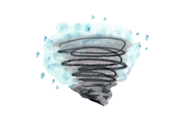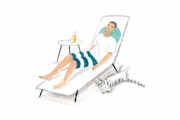When my mom died at the end of 2019, my grief was excruciating and monotonous and unprecedented and mundane all at once.
I’d always expected grief to be cataclysmic, but I wasn’t prepared for how boring it could be—the kind of boring that came when constant sorrow curdled into numbness.
And I was sure I was struggling wrong, somehow—more than I was supposed to be. Or, maybe at the wrong times, or in the wrong way. The already overwhelming pain of loss was compounded by the anxiety that during the worst moment of my life, I was somehow handling myself incorrectly.
Unpacking our understanding of grief
In Western culture, we have very specific ideas about what grief should look like. Even as we work to become more understanding about how mental health experiences can vary, there’s still a specific overarching structure that we expect grief to follow.
“Complicated grief” is even a diagnosable disorder, also known as prolonged grief disorder. This diagnosis can be a boon, helping those who are hurting name their pain, or at the very least, get their therapy covered by insurance.
At the same time, though, it begs the question: when is grief not complicated?
The stages of grief, first introduced by psychiatrist Elisabeth Kübler-Ross in 1969 and now commonly accepted, are:
denial,
anger,
bargaining,
depression, and
acceptance.
These stages are, at times, a helpful tool for those seeking guidance in the face of a pain that seems impossibly vast. At the same time, though, they can be further isolating for people whose experiences don’t match up with their clearly delineated path.

“I’m not isolating myself, I’m social distancing”
The novel coronavirus was declared a public health emergency about five months after my mom died.
At the time, I knew I wasn’t doing well. I was snapping at my friends and my partner. I was miserable in my office. Social events were unbearable, any enjoyment overcome by the wrongness of standing in colorful places packed with people when inside my mind I was wrapped in gloom, utterly alone.
So when New York hit “pause,” canceling everything that had filled me with dread and preventing me from going in to work, I felt a peculiar relief.
Of course, not a pure relief. Like everyone else, I felt fear and grief on a scale I’d not known before. Our apartment was on the same block as a hospital, and medical tents slowly encroached down the street as sirens wailed day and night. As time went on, so many—far, far too many—grappled with loss.
But because nothing was normal, I didn’t have to be, either. Our nation faced a crisis that made the (ostensibly) comforting ritual of funerals impossible, that could not be hemmed in by the inadequate structures of bereavement leave, and that made the neatness of grief stages look practically antiquated. Everyone was uncertain and afraid.
It was a testament to how unwell I’d been that I suddenly felt more at home.
Staying in was not only allowed, but mandated. I could eat fistfuls of cereal for every meal, wear the same sweatpants for days on end, and sleep in until the last possible moment.
I was fortunate to have a job that allowed me to work from home. Work, previously a venue of forced cheer and endless exclamation points, became softer. Every email was written with extra care—people had no idea what others were dealing with, could scarcely believe their own circumstances.
Without having to worry about colleagues at the next desk over, I could do what I needed most, and simply cry.
It shouldn’t take a pandemic to let grief run its course
This is not a love letter to a crisis. Hundreds of thousands of lost lives don’t have a silver lining.
In fact, every one of those lives represents a shockwave of grief that we, as a culture, have been sorely unprepared to handle. Many—medical professionals and other essential workers—who faced that grief didn’t have the luxury I did to stay home and let pain run its course.
Perhaps my grief lasted longer or hit me harder than it might have were I not already dealing with other mental health issues. In a country where an estimated one in four people live with mental health symptoms, accommodation and understanding for that reality should be the norm, not the exception.
Our culture’s ideas about illness and death also marred the way I handled my mom’s sickness, even throughout her life. The structural ableism that impacted my relationship with my mom while she was alive also contributes to our stilted views on grief and loss.
It needlessly constructs unrealistic ideas of “normalcy,” leaving no space for those who do not fit into them.
I had been treading water, trying and often failing to keep my head above the surface of my life because it truly seemed like the only option. The forced isolation and universal, indefinite fear that accompanied the pandemic gave me a sorely needed opportunity to stop trying to act okay.
But it shouldn’t have taken a pandemic. Some of the most universal experiences are also some of the most painful—grief is among them.
As a culture, it is essential that we work towards respecting mental health issues and the people behind them more, and that includes an understanding that grief cannot be bent to fit a certain mold or follow a certain path.
When it comes to grief, greater understanding of mental health means making more space for the full spectrum of human experience, and all its attendant mess.







